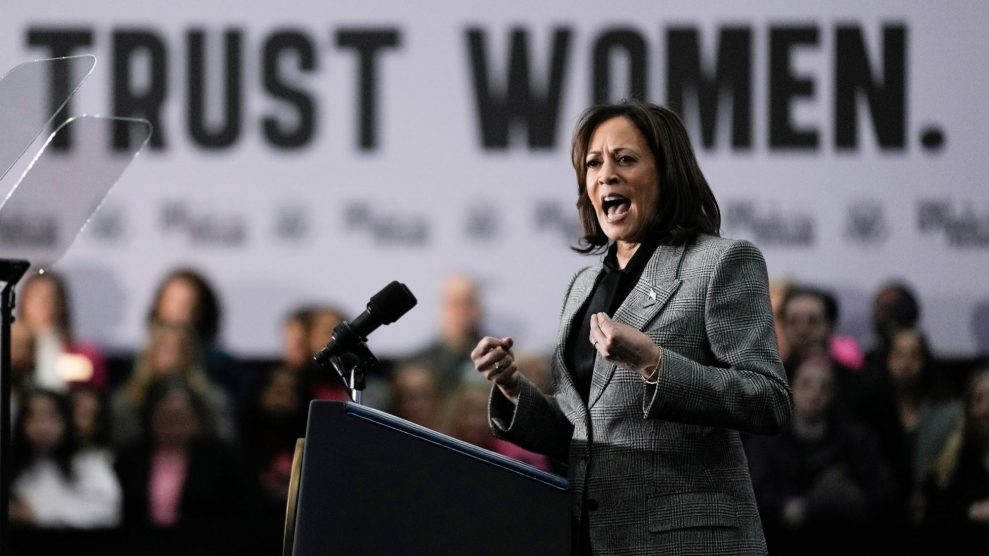
Vice President Harris has been a more direct and consistent messenger on abortion rights than President Biden.Morry Gash/AP
On Sunday, abortion rights advocates got some rare good news. After President Joe Biden announced he would not seek reelection this November, he endorsed Vice President Kamala Harris as the Democratic nominee.
Harris has been the administration’s strongest defender of abortion rights post-Dobbs—direct and consistent in her support. She has taken Trump to task for the fallout of overruling Roe; she has warned of Republicans’ ability to enact a nationwide abortion ban if Trump is re-elected; and she has traveled the country on what the White House called a “reproductive freedoms tour” to highlight the harms of abortion bans—which included a stop at a Minnesota Planned Parenthood, making her the first VP known to have ever visited an abortion clinic while in office.
Harris has also spoken out about the connections between abortion restrictions and the maternal mortality crisis in America. With abortion rights now a winning issue for Democrats, reproductive rights experts say a potential Harris-led ticket could energize Democratic voters and protect the further erosion of abortion rights if Harris is elected.
While it remains to be seen whether Harris officially clinches the Democratic nomination, having a nominee who shows strong support for abortion rights could benefit the ticket. Polls show the majority of Americans support abortion access and disapprove of the Dobbs decision, and about one in eight voters say abortion is the most important issue in their vote.
“She understands that reproductive rights and justice is not simply about securing access to abortion,” Melissa Murray, NYU Law professor and leading reproductive rights scholar, told me, adding that Harris also “recognizes the way in which the assault on democracy and the assault on reproductive freedom go hand-in-hand.”
Alexis McGill Johnson, president and CEO of Planned Parenthood Action Fund, the organization’s advocacy arm, said in a statement on Sunday, “we know that she will continue to fight like hell to rebuild a fundamental right that was stripped away.” Jessica Mackler, president of the group EMILYs List, the PAC that works to elect Democratic women who support abortion, said in a post on X, “This election will be fought and won on the issue of reproductive freedom, and [Harris] has been a pro-choice champion her entire career. She is well-positioned to turn out the voters we’ll need to win this election, especially women, voters of color, and young voters.” (EMILYs List also endorsed Harris on Sunday.) The advocacy group Reproductive Freedom for all said: “There is nobody who has fought as hard for abortion rights, and she is the candidate who can defeat Trump.”
Christian Nunes, president of the National Organization for Women, added that she thinks voters will also see Harris as a more effective messenger on abortion rights than Biden: “Being a woman, I think she understands and can empathize with having her bodily autonomy and those rights taken from her.”
But gender is not the only difference between Harris and Biden on abortion rights. A devout Catholic, Biden always seemed less comfortable articulating a full-throated endorsement for abortion rights, often avoiding even saying the word and instead professing to support “a woman’s right to choose.”
“I think for a lot of reasons—generational, religion—Joe Biden was a more reluctant standard-bearer for the cause of reproductive rights and justice,” Murray said, “and I don’t think Kamala Harris is reluctant at all—I think she has embraced these issues wholeheartedly and steadfastly.”
Harris has called out the threats posed by Project 2025, the initiative led by dozens of conservative groups and spearheaded by the Heritage Foundation, which recommends the Department of Justice in the next conservative administration prosecute “providers and distributors of [abortion] pills.” In her first statement after Biden endorsed her as the nominee, Harris said, “I will do everything in my power to unite the Democratic Party—and unite our nation—to defeat Donald Trump and his extreme Project 2025 agenda.”
Still, some say Harris could help the Democrats go even further in her support of abortion rights if she winds up as the nominee. Rachel Rebouché, Dean of Temple Law School and a leading reproductive rights scholar, said her campaign “could address Comstock head on” and highlight the right’s threats to enshrining fetal personhood in the law and rolling back medication abortion access.
But regardless, Harris is already a stronger candidate for abortion rights advocates than Biden ever was. “She actually talks about reproductive rights,” Rebouché said, “and she’s unafraid to talk about abortion.”










